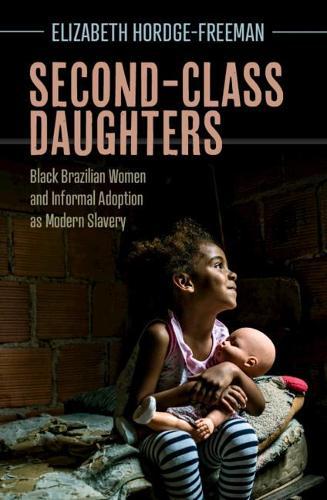Full Product Details
Author: Elizabeth Hordge-Freeman (University of South Florida)
Publisher: Cambridge University Press
Imprint: Cambridge University Press
Edition: New edition
Dimensions:
Width: 15.00cm
, Height: 1.70cm
, Length: 22.80cm
Weight: 0.440kg
ISBN: 9781009087414
ISBN 10: 100908741
Pages: 271
Publication Date: 17 March 2022
Audience:
General/trade
,
General
Format: Paperback
Publisher's Status: Active
Availability: Manufactured on demand

We will order this item for you from a manufactured on demand supplier.
Reviews
'Second-Class Daughters is a beautifully written and theoretically rich book that offers an expansive and nuanced portrait of informal adoption in Brazil. In centering the experiences of filhas de criacao, Hordge-Freeman reveals the blurring of the line between exploitation and intimate familial ties, while also reminding us of the disturbing ways that racial pasts are layered onto the present.' Tianna Paschel, University of California, Berkeley 'Written with deep compassion, insight, sensitivity, and astute knowledge of the ways race, gender, and class structure Brazilian society, Elizabeth Hordge-Freeman's new book is a must read for all those studying Brazil. It reveals how families deemed safe and sacred by many, can be the very place where devastating and life-changing discrimination and socialization into second-class citizenship can occur. By again focusing on families, Hordge-Freeman adds another major research accomplishment to her important work on race, class, and gender in Brazil.' Bernd Reiter, Texas Tech University 'A beautifully written account of Black impoverished girls given up for 'adoption' to families to raise as their daughters who instead became unpaid exploited child workers laboring within a web of ambiguous family contexts of affective bonds of gratitude, passion, and love. Hordge-Freeman weaves these life stories to expose the legacy of colonial slavery embedded in the structural disadvantages of racialized and gendered systems of oppression. Second-Class Daughters never loses sight of the women's strategies of freedom and resistance and the structural changes required to end this labor exploitation.' Mary Romero, author of The Maid's Daughter: Living Inside and Outside the American Dream
'Second-Class Daughters is a beautifully written and theoretically rich book that offers an expansive and nuanced portrait of informal adoption in Brazil. In centering the experiences of filhas de criação, Hordge-Freeman reveals the blurring of the line between exploitation and intimate familial ties, while also reminding us of the disturbing ways that racial pasts are layered onto the present.' Tianna Paschel, University of California, Berkeley 'Written with deep compassion, insight, sensitivity, and astute knowledge of the ways race, gender, and class structure Brazilian society, Elizabeth Hordge-Freeman's new book is a must read for all those studying Brazil. It reveals how families deemed safe and sacred by many, can be the very place where devastating and life-changing discrimination and socialization into second-class citizenship can occur. By again focusing on families, Hordge-Freeman adds another major research accomplishment to her important work on race, class, and gender in Brazil.' Bernd Reiter, Texas Tech University 'A beautifully written account of Black impoverished girls given up for 'adoption' to families to raise as their daughters who instead became unpaid exploited child workers laboring within a web of ambiguous family contexts of affective bonds of gratitude, passion, and love. Hordge-Freeman weaves these life stories to expose the legacy of colonial slavery embedded in the structural disadvantages of racialized and gendered systems of oppression. Second-Class Daughters never loses sight of the women's strategies of freedom and resistance and the structural changes required to end this labor exploitation.' Mary Romero, author of The Maid's Daughter: Living Inside and Outside the American Dream
Author Information
Elizabeth Hordge-Freeman is Associate Professor of Sociology, Senior Advisor to the President and Provost for Diversity and Inclusion, and Interim Vice President for Institutional Equity at the University of South Florida. She received a Fulbright grant to Brazil and Ruth Landes Memorial Fellowship to conduct this research. Her first book, The Color of Love, won three book awards, including two from the American Sociological Association (Sections on Emotions and Bodies and Embodiment).




